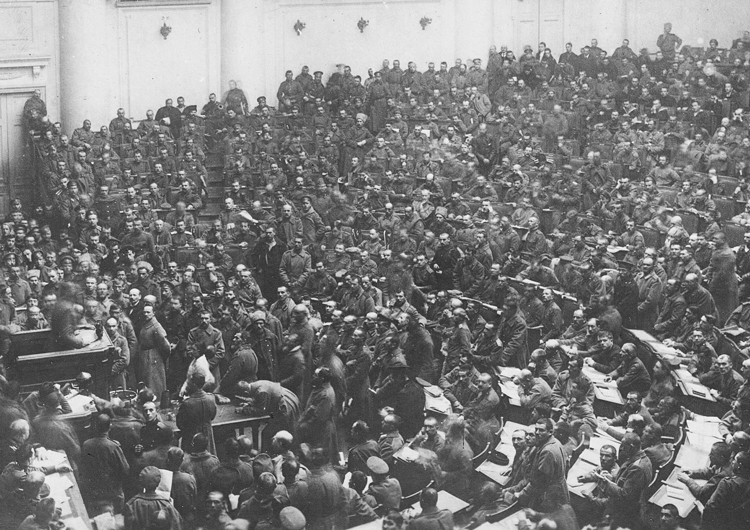From Lenin to Stalin by Victor Serge is one of Pathfinder’s Books of the Month for August. Serge was a participant as history was made by the Russian Revolution and the Communist International. This excerpt is from his account of the revolutionary workers and farmers republic under the Bolsheviks and V.I. Lenin’s leadership — and then the political counterrevolution carried out by a privileged bureaucracy led by Joseph Stalin. In the 1930s, Serge was jailed for supporting the opposition fighting to defend Lenin’s proletarian internationalist course. He wrote the book after leaving the Soviet Union in April 1936, just before Stalin’s purges and Moscow’s frame-up trials. Copyright © 1973 by Pathfinder Press. Reprinted by permission.
The entire first phase of the Russian Revolution seems to me today to have been dominated by the utter honesty of Lenin and his group. It was this that attracted all of us to him, regardless of our nationality and our viewpoint. …
Everything has changed.
The aims: from international social revolution to socialism in one country.
The political system: from the workers’ democracy of the soviets, the goal of the revolution, to the dictatorship of the general secretariat, the functionaries, and the GPU.
The party: from the organization, free in its life and thought and freely submitting to discipline, of revolutionary Marxists to the hierarchy of bureaus, to the passive obedience of careerists.
The Third International: from a mighty organization of propaganda and struggle to the opportunist servility of Central Committees appointed for the purpose of approving everything, without shame or nausea.
The defeats: from the heroism of the German and Hungarian defeats in which Gustav Landauer, Levine, Liebknecht, Rosa Luxemburg, Jogisches, Otto Corvin met their death, to the heartrending background of the Canton Commune.
The leaders: the greatest militants of October are in exile or prison. From Lenin to Stalin.
The ideology: Lenin said, “We shall see the progressive withering away of the state, and the Soviet state will not be a state like the others, but a vast workers’ commune. …” Stalin proclaims that “we advance toward the abolition of the state by way of the strengthening of the state” (sic).
The condition of the workers: the equalitarianism of Soviet society is transformed to permit the formation of a privileged minority, more and more privileged in comparison with the disinherited masses who are deprived of all rights.
Morality: from the austere, sometimes implacable honesty of heroic Bolshevism, we gradually advance to unspeakable deviousness and deceit.
Everything has changed, everything is changing, but it will require the perspective of time before we can precisely understand the realities. …
It here becomes apparent that moral criteria sometimes have greater value than judgments based on political and economic considerations. …
It is untrue, a hundred times untrue that the end justifies the means. Justice is not made by iniquity, the world and men are not transformed by means of chains, loudspeakers crying out falsehoods, and vast agencies of intellectuals paid to cram people’s head full of lies. Every end requires its own means, and an end is only obtained by the appropriate means. Though the socialist revolution may, in times of crisis, be forced to make use of the old weapons left by bourgeois society, afterwards it must find its own weapons. It can only progress by improving the material and moral condition of the masses. More personal well-being, more liberty, fewer lies, more dignity, more respect for humanity. The socialism which proceeds otherwise gives in to a sort of inner counterrevolution, discredits itself, and risks suicide.
The year 1928 plunged us headlong into that kind of socialism. Basic economic factors can plainly be seen to determine this evolution. Not that it was fatal; on the contrary, the Russian experience is all the more precious because it shows that economy can be governed, but that the consequences of a policy cannot be evaded. Let us consider the interrelation of cause and effect.
The party bureaus, beginning with the Politbureau, which is a veritable Directory [1795-99 reaction against the French Revolution], lost years before deciding for industrialization. For years they let the kulaks — the rich peasants — make themselves comfortable. …
They decapitated the old party, but immediately afterwards the government was without grain. Why should the peasant sell his wheat under such disadvantageous conditions? The cities lack bread. The army likewise. Stalin finds himself up a blind alley.
The grain that cannot be bought from the peasants must be taken from them. The Politbureau orders seizures by applying an unforeseen interpretation of Article 107 of the penal code, regarding the concealment of food supplies.
The peasants begin to hide their grain. The farmers sow less. What is the use of sowing if your harvest is going to be stolen? …
Before entering the kolkhozes [collective farms], the peasants slaughter their cattle. It seems just as well to gorge themselves with meat for once in their lives and secretly sell the leather, as to give their cattle to the state, with whose methods they are only too familiar. The cattle disappear.
These years are a nightmare. Famine comes to the Ukraine, the Black Lands, Siberia, to all the Russian granaries. Thousands of peasants flee across the frontiers to Poland, Rumania, Persia, or China. …
Obviously no one can justify this regime by command — aside from those who, having brought the nation to such a pass, would inevitably be shot if they lost their power. The weight of its responsibilities renders the bureaucracy implacable. It must defend itself. Its entire policy since the consecration of its power has been aimed solely at the preservation of that power and has been dominated by fear and panic.
The Stalinist bureaucracy no longer pursues the policies of the working class, but its own policies. This is the inner significance of its acts.


